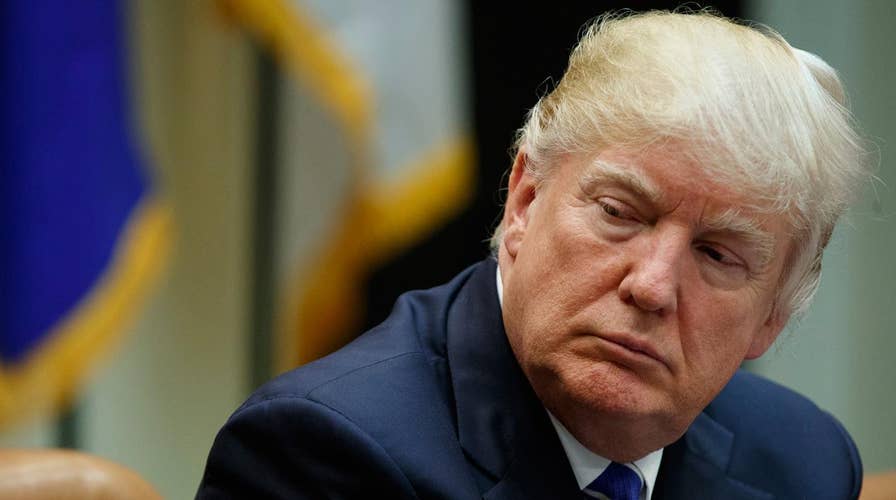Trump takes on ObamaCare subsidies
Brad Blakeman, former Deputy assistant to President George W. Bush, on President Trump ending subsidies to insurance companies under ObamaCare.
President Trump plans to halt payments to insurers under the Affordable Care Act "immediately," in a major blow to ObamaCare that is likely to draw a legal challenge.
The president, though, used the overnight decision to up pressure on Democrats to negotiate a "fix" to the "imploding" health care law.
"The Democrats ObamaCare is imploding. Massive subsidy payments to their pet insurance companies has stopped. Dems should call me to fix!" he said in a pre-dawn tweet on Friday.
He added, "ObamaCare is a broken mess. Piece by piece we will now begin the process of giving America the great HealthCare it deserves!"
The Justice Department took swift action, notifying a federal appeals court in Washington, D.C., in connection with a related lawsuit that an upcoming Oct. 18 payment “will not occur.”
The decision is the latest effort in the president’s bid to ultimately “repeal and replace” what’s considered the signature legislation of his White House predecessor.
The White House said in a statement that the Department of Health and Human Services has determined there is no appropriation for so-called cost-sharing reduction payments to insurers under the ObamaCare law.
"We will discontinue these payments immediately," said acting HHS Secretary Eric Hargan and Medicare administrator Seema Verma.
Trump's decision was expected to rattle already-unsteady insurance marketplaces. The president has previously threatened to end the payments, which help reduce health insurance copays and deductibles for people with modest incomes, but remain under a legal cloud.
Trump has privately told at least one lawmaker that the payments may continue if a bipartisan deal is reached on heath care, The Wall Street Journal reported.
Pushback expected
The president's action will likely to trigger a lawsuit from state attorneys general, who contend the subsidies to insurers are fully authorized by federal law, and the president's position is reckless. Xavier Becerra, California’s attorney general, called the decision “sabotage,” and promised a lawsuit.
After the president’s intentions were disclosed, leading Democrats in Congress were quick to criticize the plan.
In a statement, Senate Minority Leader Chuck Schumer, D-N.Y., and House Minority Leader Nancy Pelosi, D-Calif., predicted that Trump’s expected action would increase Americans’ health premiums by 20 percent or more.
"If these reports are true,” the Democrats said in the joint statement, referring to the president’s plans, “the president is walking away from the good-faith, bipartisan Alexander-Murray negotiations and risking the health care of millions of Americans.”
The Democrats were referring to bipartisan talks being led by Sen. Lamar Alexander, R-Tenn., and Sen. Patty Murray, D-Wash., to seek a bipartisan agreement for funding ObamaCare subsidies and stabilizing health insurance markets.
Order to lower premiums
Earlier Thursday, Trump predicted that “millions and millions of people” would benefit from an executive order he signed Thursday to make lower-premium health insurance plans more widely available.
But the changes Trump hopes to bring about could take months or even longer. That's according to administration officials who outlined the order for reporters. The proposals may not be finalized in time to affect coverage for 2019, let alone next year.
White House domestic policy director Andrew Bremberg said that Trump still believes Congress needs to repeal and replace the Obama-era Affordable Care Act. The White House described the order as first steps.
Trump signed the order in the White House's Roosevelt Room surrounded by Vice President Mike Pence, members of his Cabinet and Congress.
Trump employed the executive order because the Republican-controlled Congress has been unable to pass a plan to repeal and replace ObamaCare.
Trump says the health care system "will get better" with his action, and the action will cost the federal government nothing.
The president says he still wants Congress repeal and replace the Obama health care law. But he says his order will give people more competition, more choices and lower premiums.
The Associated Press contributed to this story.













































